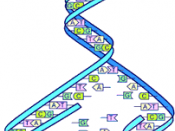Should man govern nature? This is a question that has been posed more often recently than ever before. Humans will soon know the secret to life and be able to use that secret in many different ways. There are numerous ramifications of the human genome project. Many people are afraid of the frightening possibilities and ethical dilemmas.
The Human Genome project formally began in 1990. It was a 13-year effort coordinated by the U.S. Department of Energy and the National Institutes of Health. It was originally planned to last 15 years, but rapid technological advances accelerated the projects end date to 2003. The projects goals were to identify all the approximately 20,000-25,000 genes in human DNA, determine the sequences of the 3 billion chemical base pairs that make up human DNA, store this information in databases, improve tools for data analysis, transfer related technologies to the private sector, and address the ethical, legal, and social issues (ELSI) that may arise from the project.
A Genome is the total of an individualÃÂs genetic material, including, that part of the cell that controls heredity. Subsequently, research and technology efforts aimed at mapping and sequencing large portions or entire genomes are called genome projects (Human genome Project, 2008).
Questions have been posed that new forms of life could be created or replicated. Others are concerned about the possibility that genetic weapons could be made to spread numerous genetic diseases that would either be known or unknown to man. Doctors also have moral and ethical concerns about the possibilities of this project. Some physicians believe that there is a natural order of things, and that we should not manipulate ÃÂGodÃÂs wayÃÂ. But such genetic information may open keys to discovering cures to diseases that inflict us as humans. The ultimate goal is to use...


